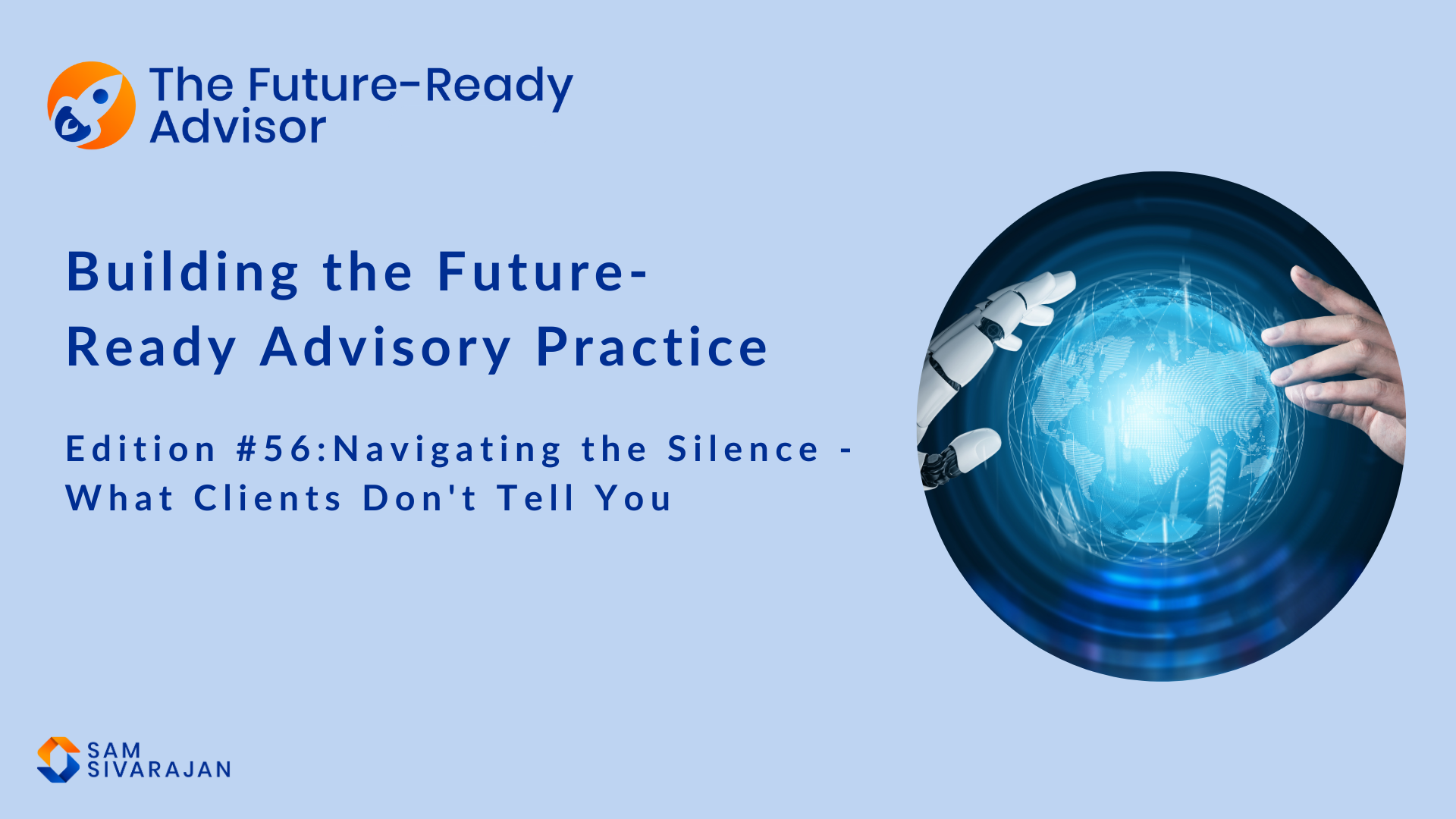Welcome to the 56th edition of #theFutureReadyAdvisor Newsletter!
Subscribe & join the conversation. Share comments and feedback.
“I’m comfortable with risk.”
“I understand how markets work.”
“My primary goal is to maximize returns.”
These are things clients say all the time. But are they what clients truly mean?
In the summer of 2007, I met John, a CEO who had just pocketed $40 million after selling his company. He was adamant about getting 15% annual returns. When I asked what he’d do with the $100 million he’d have in seven years at that rate, he paused.
“$100 million? I can’t even spend $40 million,” he admitted. “I grew up poor. I don’t need more than $300,000 a year.”
When I pointed out that he could earn that with just 1% interest, he fell silent. Then, emotion in his voice, he spoke about his teenage children. He wanted them to grow up with his values—hard work, perseverance, risk-taking—not spoiled by wealth. He envisioned a “family bank” where his children could apply for education or business funding.
In that moment, a man fixated on high returns discovered what truly mattered to him. Just by digging deeper.
The Hidden Conversations
In my years working with financial advisors and their clients, I’ve discovered that the most important information often lies in what remains unsaid. Beneath the surface of standard financial discussions, clients carry unspoken fears, unacknowledged aspirations, and deeply personal money stories that profoundly influence their decisions.
These hidden factors—what I call the “iceberg conversations”—operate below the waterline of awareness, yet they drive behavior more powerfully than any consciously stated goal or preference.

Some of the most common unspoken client concerns include:
- Fear of looking financially ignorant or unsophisticated
- Shame about past financial mistakes
- Anxiety about becoming a burden to family
- Conflicting financial values between spouses
- Guilt about wealth or inheritance
- Unstated hopes for children or legacy
When these crucial concerns remain unvoiced, we end up addressing the symptoms rather than the causes of financial behavior. We might create technically perfect financial plans that clients never fully embrace because we’ve solved for the wrong problem.
Why Clients Don’t Tell Us Everything
The silence isn’t because clients are deliberately withholding information. Several powerful forces keep these crucial insights hidden:
1. The Expert-Client Dynamic Most professional relationships create an inherent power imbalance. Clients worry about appearing uninformed or naive. They hesitate to raise concerns that might seem “stupid” or unsophisticated, particularly with advisors who project an aura of expertise.
2. Emotional Discomfort Money is deeply emotional, yet our industry treats it as primarily logical. Many clients lack the vocabulary to express their financial feelings or fears. When an advisor asks, “What are your financial goals?” a client might default to standard answers about retirement or education because articulating deeper emotional needs feels too vulnerable.
3. Unconscious Motivations Many of our financial behaviors are driven by unconscious patterns we developed in childhood or early adulthood. Clients can’t tell you what they don’t consciously know themselves.
One advisor I know worked with a client who consistently rejected perfectly sound investment recommendations. It wasn’t until several meetings in that she revealed her father had lost the family home to foreclosure when she was twelve. The memory of watching her parents pack their belongings had created a powerful aversion to any perceived financial risk—an aversion she hadn’t fully recognized herself.
Creating Space for the Unspoken
How do we create environments where clients feel safe sharing what truly matters? I’ve found several approaches that consistently bring the iceberg conversations to the surface:
1. Ask Different Questions Most financial discovery focuses on quantitative information: risk tolerance, time horizons, asset values. While important, these questions rarely reveal the emotional drivers of financial behavior.
Instead, try questions that invite narrative and reflection:
- “Tell me about your earliest memory involving money.”
- “What financial lessons did your parents teach you, either directly or by example?”
- “When you think about your financial future, what keeps you up at night?”
- “What would have to happen for you to feel financially successful?”
2. Listen for the Emotional Subtext Often, clients give us clues to their deeper concerns through emotional cues that we miss because we’re focused on the technical content of the conversation.

When a client says, “I just don’t want to lose money,” listen for the emotion behind the statement. Is it fear? Anxiety? Past trauma? The emotional tone often reveals more than the words themselves. And then dig deeper. Ask clarifying questions. Show that they have been heard.
3. Create Safe Spaces for Vulnerability Our physical environments and conversational approaches can either invite or discourage personal disclosure. Simple changes can make a significant difference:
- Meet in comfortable, private spaces rather than formal conference rooms
- Use circular seating arrangements instead of across-the-desk positioning
- Put away devices and give undivided attention
- Practice reflective listening: “What I hear you saying is…”
- Share your own authentic stories—let clients know they’re not alone in their concerns or experiences
4. Slow Down Iceberg conversations emerge when we create space for them. Many advisors rush through discovery processes, eager to demonstrate expertise by providing solutions. But meaningful disclosure requires unhurried space and attentive listening.
One of my most profound client breakthroughs came when I simply sat in silence after asking a question rather than filling the pause. That extra ten seconds of waiting led to a revelation that completely reshaped our approach. And led to a more trusted client relationship.
The Power of Deeper Understanding
This week, consider which of your client relationships might benefit from exploring beneath the surface. What conversations are waiting to happen that could transform how you serve them?
Remember: the most important information is often what clients don’t tell you—until you create an environment where they can.
Wealth, first and foremost, should be viewed as a means to an end rather than an end in itself. Wealth provides its owner with the means to build new ventures, fund worthy causes, and empower future generations — or to simply enjoy its benefits. Values, goals, and objectives are the wealth owner’s guideposts, getting them to where they want to be.
Sam Sivarajan, Making Your Money Work
✨ Enjoyed this edition of The Future-Ready Advisor? Share the insights! Invite your friends and colleagues to subscribe and join nearly 1,100 other forward-thinking advisors. Let’s grow our community together.
💬 Have feedback or a topic you’d like covered? Drop me a note on LinkedIn—I’d love to hear from you!
👉 When you’re ready to take the next step, I’m here to support you with:
- Engaging Speaking Engagements & Workshops designed for your team and clients
- Customized Consulting & Coaching Services to elevate your practice
Explore my podcast, articles, and more free resources at www.samsivarajan.com.


